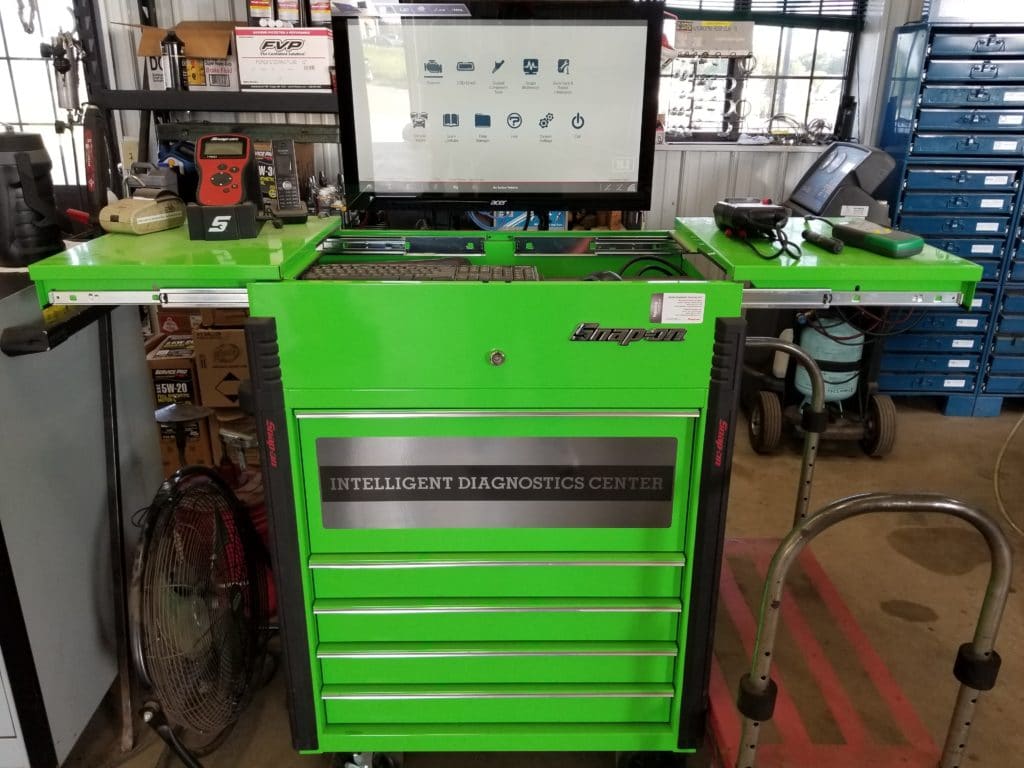Should Techs Have to Provide their Own Scanners and Diagnostic Tools?

We have previously discussed the necessity for techs to buy their own tools in order to do their jobs and remain competitive in the automotive repair industry. The sheer number of tools required, as well as their cost, causes many techs a great deal of stress. This applies to hand tools as well as scanners and diagnostic tools. Should shops have to bear the cost of diagnosis by providing the necessary scan tools? This can be a controversial issue within the industry.
Most auto repair shops require their techs to have a basic set of tools and view having a complete set as a sign of professionalism. Do scanners meet the definition of a “basic” tool? Before cars were computerized, the tool requirements were much more basic and affordable for the average tech. The problem with requiring technicians to buy their own scan tools today is that there are so many types of scanners and diagnostic tools, and they must be continually updated in order to function properly.
Types of Scanners and Diagnostic Tools
Which types of scan tools are necessary to do the job?
OEM diagnostic scan tools are tools that car manufacturers make available via licensing. They run on a Windows PC and require a J2534- or RP1210-compatible interface. They usually offer the most complete support for their manufacturers’ vehicles, but they are expensive. When licensed software needs to be purchased for each make of vehicle the shop services, the cost adds up quickly.
Aftermarket diagnostic scan tools utilize data licensed through each OEM. This is combined with test and validation work done by the tool manufacturer. These fall into two categories: basic and advanced. Basic, or generic, scan tools are very limited in what they can diagnose. Typically, they only read data from the engine control unit (ECU). Sometimes they also communicate with the transmission control unit (TCU) or the hybrid controller.
Modern cars contain between 20-50 different controllers which run and control the different vehicle systems. Basic scan tools only have the capability to decode SAE-standard diagnostic trouble codes (DTCs). They may not be able to detect up to 90 percent of DTCs. Most scanners in the hands of consumers are this basic type.
Advanced diagnostic tools are able to integrate far more, if not all, of the vehicle’s controllers. They can read and decode SAE-standard and manufacturer codes as well. Some are capable of running tests on components and recalibrating them. Obviously, these are much more valuable. They are also far more expensive.
Should Techs Invest In Scan Tools?
Many enthusiastic techs invest in tools in order to be competitive and “corner the market” on certain types of makes or repairs. The tech has a greater motivation to finish his work faster if he’s working under certain incentive-based systems. He’ll make more money if he has what he needs to to work efficiently.
Other techs are addicted to collecting tools and can’t say no when something new comes available. The question of who should invest in scan tools – techs, shop owners, or both – can raise hackles, however, as any topic involving money or compensation does.
Typically, auto shops will make larger equipment available to their techs. Some shops choose to provide more tools or a tool allowance to their techs. It varies from shop to shop, and it’s something that techs will consider when they determine which position is in their best interest. Having a complete set of tools means the tech is not dependent on a shop to provide them and he can go anywhere, but it often means he’s in debt to his tool provider. Tools are not cheap, whether hand tools or scan tools.
Shop owners should understand that every dollar that they invest in specialty tools like diagnostic tools is not only an investment in their shops, it’s an investment in their techs. Good techs are harder to find all of the time, so owners and managers should take into account how much more money a tech will have in his pocket when the shop provides him with the tools he needs to do his job. When techs feel like they are going more and more into debt just to work for a shop, what’s the incentive to stay? A generous tool policy is great for recruitment.
Every dollar the owner invests in specialty shop tools and updating them is effectively a tech raise. If techs have to fumble around without tools or tools that work inadequately or incorrectly, this costs the techs, the shop, and the customer money. Good tools increase the shop’s abilities, and over time this benefits everyone as it will attract more customers to the shop. When shops have the capability to diagnose and program via their diagnostic tools, it generates business. How often is your shop turning away jobs because you don’t have the right tool for the repair?
At the Automotive Management Network, we’re interested in knowing the experiences of our members. What kind of tool policy does your shop have? How does it affect the talent it’s able to attract? Do your techs have to provide their own scanners and diagnostic tools? Please leave your comments either here or in our forums. We would love to hear from you.


Responses